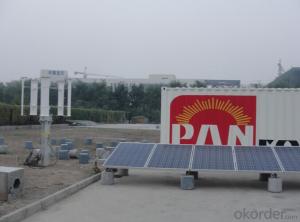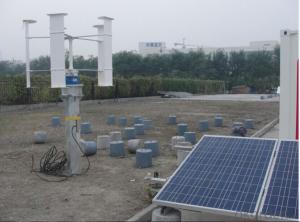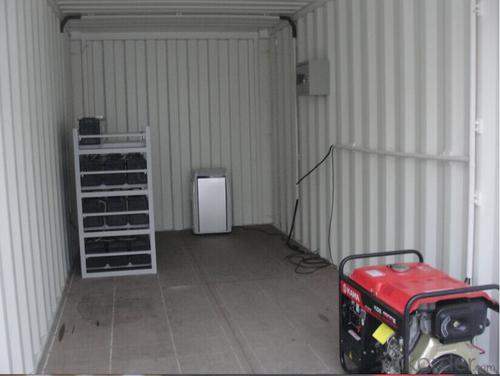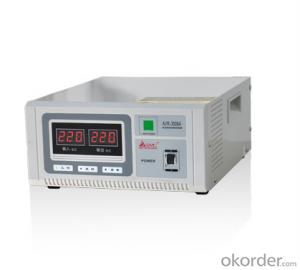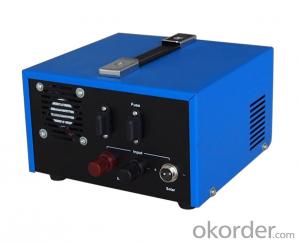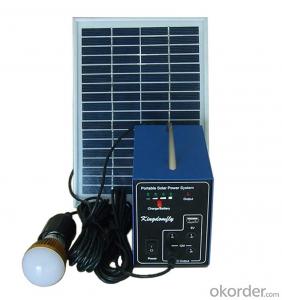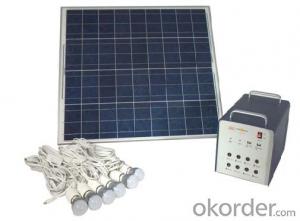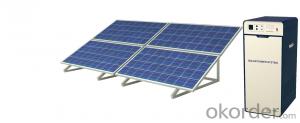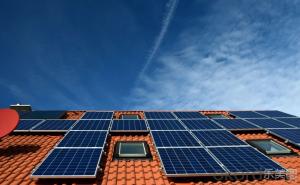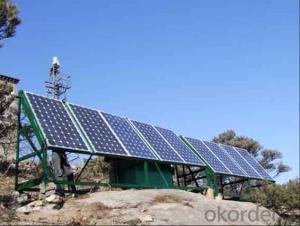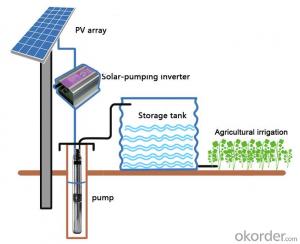Active Solar Energy Systems - Wind-PV(Diesel)Hybrid Power System 10kW
- Loading Port:
- Tianjin
- Payment Terms:
- TT OR LC
- Min Order Qty:
- 1 set
- Supply Capability:
- 30 set/month
OKorder Service Pledge
OKorder Financial Service
You Might Also Like
Specification List
Name | Specification | Quantity | |
1 | Containter | 20*8*8.6ft | 1 |
2 | Solar Module | 240W | 30 |
3 | Wind Generator | 500W | 2 |
4 | Battery | 12V120Ah | 20 |
5 | Controller | 120V/40A | 1 |
6 | Inverter | 6000W/AC230V | 1 |
7 | Diesel | 5000W/AC230V | 1 |
8 | Air Conditioner | 1000W | 1 |
9 | Cables | — | — |
10 | Others | — | — |
2.System Principle
3.System Advantage
Extend battery life |
Reduce the dependence of climate system |
24 hour uninterrupted power supply |
Low maintenance cost |
4.Product Specification
(A) Solar Module
Rated Power | 240W |
Vmppt | 29.4V |
Imppt | 8.17A |
Voc | 37.4V |
Isc | 8.55A |
Power Temp.Coeff(/℃) | -0.47% |
Ambient Temp | -40-85℃ |
Power Tolerance | ±3% |
NOCT | 46℃±2 |
(B) Battery
Rated Voltage | 240V | |
Rated Capacity (C10) | 120Ah | |
Weight | 35kg | |
Dimension | Lenth | 406mm |
Width | 174mm | |
Height | 209mm | |
Capacity | C120 | 150Ah |
C30 | 138Ah | |
C10 | 120Ah | |
C1 | 78Ah | |
Overcharging Protect Voltage | 14.4V/12V | |
Cut off Voltage | 10.8V/12V | |
(C) Wind Generator
Rated Power | 500W |
Rated Wind Speed | 13m/s |
Cut-in Speed | 4m/s |
Cut-out Speed | 25m/s |
Survival Wind Speed | 45m/s |
Mill Diameter | 1.36m |
Mill Height | 1.05m |
Mill Weight | 90kg |
Rated Voltage | AC 42V |
Rated Current | AC 6.9A |
Protection Level | IP54 |
(D) Controller
Solar Controller
Rated Power | 7.2KW |
MPPT | DC120V-350V |
Rated Voltage | DC 120V |
Rated Current | 60A |
Conversion Efficiency | ≥93% |
Overload Capacity | 120% output, 30mins |
Wind Generator Controller
Rated Power | 500W |
Maximum Power | 750W |
Rated Voltage | AC 42V |
E) Inverter
Rated Power | 6000W |
Rated Input Voltage | DC 120V |
Rated Input Current | DC 50A |
Rated Output Voltage | AC 230V |
Rated Frequency | 50Hz |
Rated Current | AC 26.1A |
Output Voltage Precision(V) | 230±5% |
Output Frequency Precision(Hz) | 50±0.05 |
Overload Capacity | 120%, 60S; 150%, 10S |
Inverter Efficiency | 80% |
- Q: Can a solar energy system be installed on a sports arena or stadium?
- Yes, a solar energy system can be installed on a sports arena or stadium. In fact, many stadiums around the world have already implemented solar panels to generate clean and renewable energy. These systems can be installed on rooftops, parking lots, or even integrated into the design of the stadium itself. Not only does this help reduce the carbon footprint of the facility, but it also helps offset energy costs and promotes sustainability in the sports industry.
- Q: Solar power generation system installation which precautions, ah, there is a need for special attention
- Pay attention to the basic power calculation is not enough! The reality is not up to
- Q: Can solar energy systems be leased or rented?
- Yes, solar energy systems can be leased or rented. Leasing or renting solar panels allows individuals or businesses to access the benefits of solar energy without the upfront costs of purchasing the system. This option is especially popular for those who may not have the financial resources to buy a solar energy system outright.
- Q: How do I monitor the performance of my solar energy system?
- To effectively keep track of your solar energy system's performance, there are several essential steps you can take: 1. Install a monitoring system: Make sure your solar energy system has a monitoring system in place. This involves installing a device or software that collects and analyzes data from your solar panels, inverters, and other components. Many solar energy systems already have built-in monitoring capabilities, so check with your manufacturer or installer to confirm. 2. Keep an eye on energy production: Monitoring the energy production of your solar panels is crucial for evaluating their performance. The monitoring system should provide real-time information on the amount of electricity your panels are generating. This data helps you identify any issues or discrepancies in energy production, such as shading or malfunctions, so you can take appropriate action. 3. Monitor energy consumption: To optimize your system's performance, it's important to understand your energy consumption patterns alongside solar energy production. Consider installing a smart meter or energy monitoring device that tracks your household's energy usage. By comparing energy production and consumption data, you can determine if your system is generating enough electricity to meet your needs or if adjustments are necessary. 4. Analyze historical data: Regularly reviewing historical data from your monitoring system offers valuable insights into the long-term performance of your solar energy system. Look for trends, such as seasonal variations in energy production, and compare them to your energy requirements. This analysis helps you make informed decisions about system upgrades, maintenance, or future expansions. 5. Set performance benchmarks: Establishing performance benchmarks allows you to measure the effectiveness of your solar energy system. Compare your system's actual energy production to predicted or expected values. If there is a significant deviation, it may indicate a problem with your system that needs attention, such as faulty equipment or suboptimal installation. 6. Maintain and inspect regularly: Conducting regular maintenance and inspections of your solar energy system is crucial for optimal performance. This includes cleaning the solar panels to remove dirt or debris, checking for any physical damage, and ensuring all components are functioning properly. Monitoring system alerts or notifications can help you identify maintenance needs or potential issues early on. 7. Seek professional assistance if needed: If you're uncertain about monitoring your solar energy system or encounter persistent performance issues, it's advisable to seek professional assistance. Solar energy system installers or technicians can help troubleshoot problems, provide guidance on monitoring systems, and suggest improvements to optimize your system's performance. By following these steps, you can effectively monitor your solar energy system and ensure it performs at its best, maximizing the benefits of renewable energy generation.
- Q: Can solar energy systems be used in areas with high levels of hail or other severe weather conditions?
- Yes, solar energy systems can be used in areas with high levels of hail or other severe weather conditions. While severe weather conditions like hail can potentially damage solar panels, modern solar panels are designed to withstand various weather conditions, including hailstones of a certain size and velocity. Solar panels are typically made with durable materials such as tempered glass and are tested to withstand hailstones of a specific size and impact force. They are engineered to be strong enough to endure hailstorms without shattering or losing their efficiency. Additionally, solar panels are often installed at an angle to allow hailstones to slide off rather than directly impact the surface, further minimizing the risk of damage. Furthermore, advancements in solar technology have led to the development of more robust and resilient solar panels. For instance, some manufacturers offer panels with enhanced hail-resistant features, such as reinforced glass or protective coatings, to provide extra durability in areas prone to severe weather conditions. It is important to note that while solar panels can withstand hail, the severity and frequency of the hailstorms should be taken into consideration when planning and installing solar energy systems. Local weather patterns and historical data can help assess the risk level and determine the appropriate measures for protecting the panels, such as using hail guards or installing additional protective layers. In conclusion, solar energy systems can be used in areas with high levels of hail or other severe weather conditions as long as the panels are designed and installed to withstand such conditions. Proper planning, the use of resilient materials, and periodic maintenance can help ensure the long-term performance and durability of solar energy systems in these areas.
- Q: Can solar energy systems be used for powering electric vehicle delivery services?
- Yes, solar energy systems can definitely be used for powering electric vehicle delivery services. Solar panels can be installed on the roofs of warehouses or delivery hubs to generate clean and renewable electricity. This solar energy can then be stored in batteries or directly used to charge the electric vehicles used for delivery services. By harnessing the power of the sun, electric delivery vehicles can be charged during the day and be ready to use for deliveries. This not only reduces the carbon footprint associated with delivery services but also helps to reduce operating costs by saving on fuel expenses. Furthermore, using solar energy for electric vehicle delivery services promotes sustainable practices and supports the transition to a greener and more sustainable future.
- Q: Are there any noise or vibration issues with solar energy systems?
- Yes, there can be noise and vibration issues with solar energy systems, although they are generally minimal compared to other forms of energy generation. Solar panels themselves do not produce any noise or vibration as they convert sunlight into electricity. However, some components of the system, such as inverters or mounting structures, may generate a slight humming sound or vibration. This can vary depending on the quality and design of the system. Additionally, if the solar panels are installed on a roof or near living spaces, there might be some audible noise or vibration transmission through the building structure. However, these issues are typically considered minor and are often outweighed by the environmental and economic benefits of solar energy.
- Q: How do solar energy systems impact energy affordability?
- Solar energy systems can significantly impact energy affordability by reducing monthly energy costs for homeowners and businesses. By harnessing the power of the sun, these systems generate electricity that can offset or even eliminate the need to rely on traditional energy sources. This leads to substantial savings on electricity bills over time, making energy more affordable for those who invest in solar. Additionally, solar energy systems can also contribute to overall energy affordability by reducing the strain on the electrical grid, which can help stabilize energy prices for everyone.
- Q: Can solar energy systems be used for powering off-grid communities?
- Yes, solar energy systems can be used effectively for powering off-grid communities. Solar panels can generate electricity by converting sunlight into usable energy, making it an ideal solution for areas that lack access to traditional power grids. By installing solar panels and utilizing battery storage systems, off-grid communities can meet their energy needs sustainably and independently. Solar energy is a clean and renewable source, providing a reliable and cost-effective solution for powering off-grid communities.
- Q: Can a solar energy system be installed on a church or religious building?
- Yes, a solar energy system can be installed on a church or religious building. In fact, many religious organizations have started to embrace solar energy as a sustainable and environmentally friendly solution to reduce their carbon footprint and lower their energy costs. Installing solar panels on the roof of a church or religious building can generate clean and renewable energy, which can be used to power the facility and reduce its reliance on traditional energy sources. Additionally, by going solar, religious organizations can set an example for their communities and inspire others to adopt clean energy practices.
Send your message to us
Active Solar Energy Systems - Wind-PV(Diesel)Hybrid Power System 10kW
- Loading Port:
- Tianjin
- Payment Terms:
- TT OR LC
- Min Order Qty:
- 1 set
- Supply Capability:
- 30 set/month
OKorder Service Pledge
OKorder Financial Service
Similar products
Hot products
Hot Searches
Related keywords

